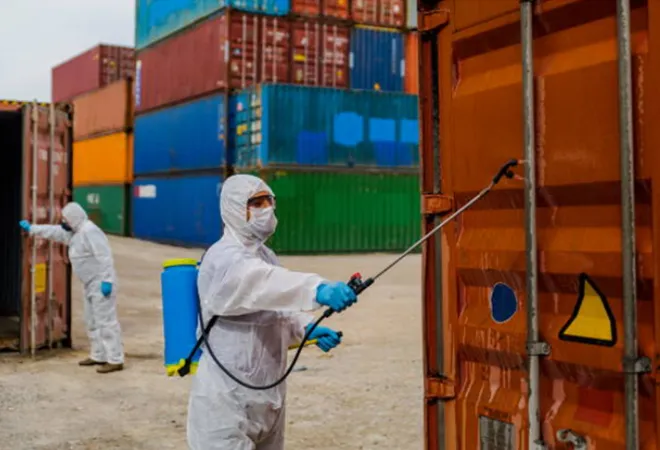-
CENTRES
Progammes & Centres
Location
For the first time, healthcare/social responsibility of ports have come into the limelight bearing implications not only for the port community but the wider society as well.

Minutes after the Indian Prime Minister declared the nation-wide lockdown on 24 March, the Ministry of Home Affairs issued guidelines pertaining to the new order followed by an addendum on essential services and commodities that would remain available during this period. Along with other essential services, the continued operation of seaports has been deemed necessary for cargo movement and inter-state movement of goods/cargo for inland and exports as it ensures the regular supply of goods in the country.
Ports, however, in their role as facilitators of a country’s trade and commerce are also maritime ‘gateways’ — functioning as the country’s principal nodes of connectivity across the globe. Shipping traffic ensures that there is a regular interaction between people of different countries on a daily basis. Therefore in times of a pandemic such as now, ports which are the epicentres of physical connectivity are at the height of vulnerability. Although the ports are now operating with bare minimum staff and more relaxed provisions of operation, as the employees come in touch with people from various countries and each other, the chances of them contracting the disease is high which in turn increases the risk of community transmission.
Accordingly, the Indian Ministry of Shipping and the Directorate General of Shipping have generated comprehensive guidelines on people-to-people interactions and vessel handling which have subsequently been implemented by ports across the country. Such measures range from restrictions on vessel entry at ports, regulating crew change, submitting Maritime Declaration of Health by incoming vessels to the concerned port authorities and ensuring availability of thermal scanners and sufficient Personal Protective Equipment (PPE) in the ports. The Ministry of Shipping has also declared 50 lakh monetary compensation to the Major Port employees, workers and all contractual labourers in case of loss of life due to COVID-19 infection while discharging port related duties.
Ports too have adopted these guidelines and undertaken appropriate measures of containment, fumigation of port premises and docks, regular thermal screening and maintaining social distancing. For example, health of the crew on board is being strictly monitored by the Visakhapatnam Port Trust, while emergency measures are being kept ready. It is also interesting to note that in the Kolkata Port Trust inspection committees named as ‘COVID Warriors’ are regularly checking the implementation of these measures in the various departments. The port has also deemed it necessary to train its employees in using protective gear and maintaining social distancing. Hospitals across the Major Port Trusts have been supplied with PPE and arrangement has been made for availability of sufficient staff. As directed by the Ministry of Health and Family Welfare, mock drills have been carried out in the Chennai Port Trust Hospital, and reviews have been undertaken to ensure their preparedness against COVID-19. Meanwhile the Jawaharlal Nehru Port Trust acknowledging that healthcare facilities has opened an 18 bedded quarantine centre to enhance preparedness. A total of 46,202 passengers have been scanned between 27 January and 4 April using thermal scanners at Indian ports out of which, 39,225 people were scanned at Major Ports.
However, curative measures are as necessary as preventing ones in dealing with a pandemic. Herein, it must be noted that there are two layers in every port community which may be understood in the form of two concentric circles. The first comprises of the direct and contractual employees of the port and the second consist of all those who live or work in and around the port area but are not directly dependent on the port. They consist of markets, industries, schools, fishermen and often small villages. It is interesting to note however that only the first layer of the port community can avail of the medical benefits and hospital facilities that the port offers. Therefore although both layers are susceptible to the transmission of COVID-19 due to activities of the port, it is the second layer which is at a greater disadvantage with the inability to access the port led healthcare opportunities. It may be argued in this regard that it is not legally the ports’ responsibility to extend such facilities beyond their staff but herein one is reminded of the ports Corporate Social Responsibility <1> (CSR), the revised guidelines of which have recently been published by the Ministry of Shipping to aid the Major Ports in formulating their CSR plans for the new financial year.
Under the CSR policy guideline, the ports realising the economic, social and environmental impact of port activities are committed to operate in a sustainable manner while recognising the role of their stakeholders. But as ports are not corporate bodies, the CSR policy as it exists under the Companies Act of 2013 is not applicable to the Major Ports. However as non-profit trust organisations, the Major Ports allot 3 percent of their income for CSR activities which usually benefits the social development of the entire port community. These are mostly manifested in the port’s monetary contribution to schools, maintenance of roads and in some cases undertaking social development in nearby Coastal Economic Zones. Increasing hospital facilities and extending health coverage beyond the port’s immediate employees however has not featured prominently in CSR activities although presently ports and Public Service Undertakings under the Ministry of Shipping have contributed more than INR 52 crore from their CSR funds towards PM CARES Fund.
The COVID-19 pandemic has indeed brought to light the need for investing more in healthcare services across the country. In the ports which are presently at high risk the existing medical facility is limited and hence there is need for not only increasing its availability in terms of increasing hospital infrastructure but also its accessibility to the larger port community. It often happens that ports while expanding infrastructure, encroaches into the land of neighbouring villages which then stand to be affected by the activities of the port. It is therefore necessary to determine whether the port should be made responsible for ensuring health facilities and benefits in these port and port adjoining areas.
In this context it is also important to ponder upon the criteria of healthcare facilities in port CSR activities. According to the newly revised guidelines, ports must allot 78% of their CSR funds for a wide range of developmental activities one of which is ‘Health and Family Welfare’. Clearly a more substantial portion needs to be devoted for health alone. If the port does channelise funds towards hospital development, it is not enough to only provide the necessary resources. The ports must also have a well framed plan of action to ensure that these funds are properly utilised. This requires more emphasis on healthcare as a part of the ports’ CSR activities in such emergency situations is already being addressed by the Paradip Port Trust. A 150-bed hospital dedicated entirely for the treatment of COVID-19 patients will soon be operative in Biju Yatri Nivas at Paradip. It is being funded by local industries and the Paradip Port Trust as a part of their CSR initiative.
For the first time, healthcare/social responsibility of ports have come into the limelight bearing implications not only for the port community but the wider society as well. It would thus be interesting to witness the impact COVID-19 will have in redefining the social role of the ports and their CSR activities. As preparations are being made for the Maritime Agenda 2020-2030, it is expected that the social responsibility of ports will be prioritised in tandem with its economic significance.
The author would like to acknowledge S.K. Saha Roy, Former Traffic Manager, Haldia Dock Complex, Kolkata Port Trust; A.K. Nath, OSD Environment, Kolkata Port Trust and M.V. Kapardee, Consultant (Research) Visakhapatnam Port Trust for their guidance and insights.
<1> Corporate Social Responsibility for Major Ports in India, Revised Guidelines, Ministry of Shipping, April 2020, http://shipmin.gov.in/showfile.php?lid=3016. Accessed on 30 April 2020.
The views expressed above belong to the author(s). ORF research and analyses now available on Telegram! Click here to access our curated content — blogs, longforms and interviews.

Sohini Bose is an Associate Fellow at Observer Research Foundation (ORF), Kolkata with the Strategic Studies Programme. Her area of research is India’s eastern maritime ...
Read More +